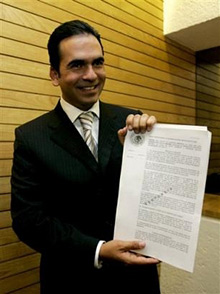 |
 |
 |
 Entertainment | Books | March 2006 Entertainment | Books | March 2006  
Mexican Judge Orders Writer to Modify Book Accusing First Lady's Son of Influence Peddling
 E. Eduardo Castillo - Associated Press E. Eduardo Castillo - Associated Press


| | Manuel Bribiesca's lawyer, Ruben Ayala shows a document containing the judge's decision to the press in Mexico City, Mexico on Tuesday March 28, 2006. A Mexican judge ordered Argentine journalist Olga Wornat to remove references to Bribiesca, one of Mexican first lady Marta Sahagun's sons, in a book that claims he benefited financially from his family's political connections, Tuesday, March 28, 2006. (AP/Eduardo Verdugo) |
Mexico City – A Mexican judge ordered an Argentine journalist Tuesday to remove references to one of the first lady's sons in a book that claims he benefited financially from his family's political connections.

The judge also fined the journalist, Olga Wornat, and ordered that the ruling be published in a Mexican magazine that published excerpts of the book. The decision came in response to a civil lawsuit filed by Marta Sahagun's son Manuel Bribiesca, who claimed the book, titled “Cronicas Malditas,” or roughly “Accursed Chronicles,” caused him “moral damage.”

Published in 2005, the book alleged that two of Sahagun's three sons, principally Manuel Bribiesca, had used their connections to get preferential treatment on federal government work contracts during the administration of President Vicente Fox, which began in December 2000.

Sahagun's sons are from a previous marriage. She married Fox in 2001, and they have no children.

Sahagun filed a similar lawsuit against Wornat in 2005, claiming that the writer caused her “moral damage” by publishing church annulment documents in which Sahagun allegedly described the intimate details of her failed first marriage. That lawsuit has not been resolved.

Wornat's lawyer, Cristian Zinzer, confirmed the ruling and said the writer would appeal. He said the amount of the fine had not been determined.

Contacted by telephone, Wornat told The Associated Press she believed Tuesday's decision was more political than legal because Bribiesca had not proved “moral damage.” | 
 | |
 |



